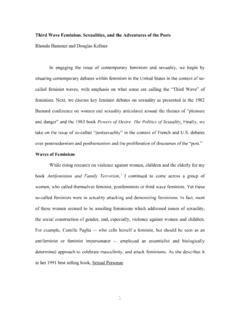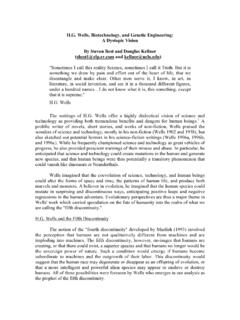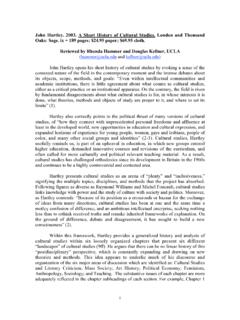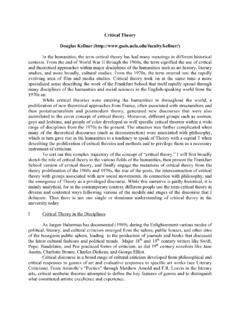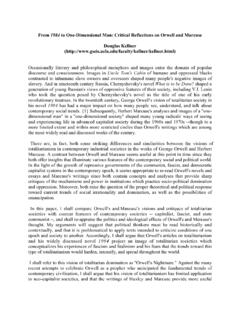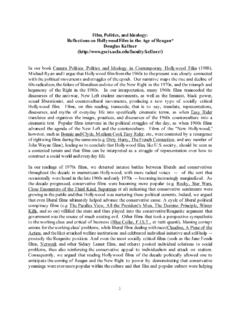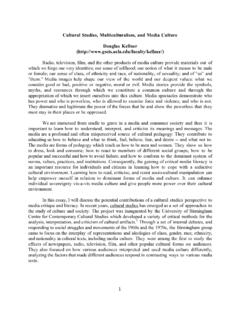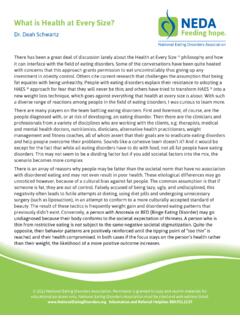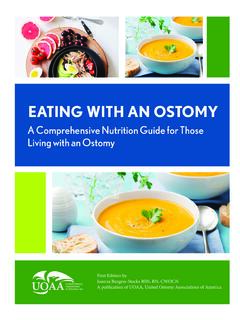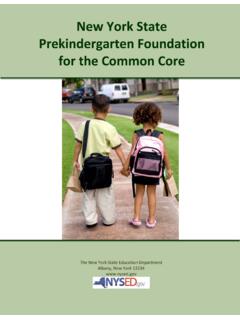Transcription of Marxian Perspectives on Educational Philosophy: From ...
1 Marxian Perspectives on Educational Philosophy: From ClassicalMarxism to Critical PedagogyBy Douglas Kellner ( )It is surely not difficult to see that our time is a time of birth and transitionto a new period. The spirit has broken with what was hitherto the world ofits existence and imagination and is about to submerge all this in the past;it is at work giving itself a new form. To be sure, the spirit is never at restbut always engaged in ever progressing the spirit that educatesitself matures slowly and quietly toward the new form, dissolving oneparticle of the edifice of its previous world after the other.
2 This is interrupted by the break of day that, like lightning, all atonce reveals the edifice of the new 1965 [1807]: theory associated with Marxism was developed in mid-19th century Europeby Karl Marx and Friedrich Engels. Although Marx and Engels did not write widelyabout education, they developed theoretical Perspectives on modern societies that havebeen used to highlight the social functions of education and their concepts and methodshave served to both theorize and criticize education in the reproduction of capitalistsocieties, and to support projects of alternative education.
3 In this study, I will first brieflysketch the classical Perspectives of Marx and Engels, highlighting the place of educationin their work. Then, I lay out the way that Marxian Perspectives on education weredeveloped in the Frankfurt School critical theory, British cultural studies, and other neo- Marxian and post- Marxian approaches grouped under the label of critical pedagogy, thatemerged from the work of Paulo Freire and is now global in scope. I argue that Marxismprovides influential and robust Perspectives on education, still of use, but that classicalMarxism has certain omissions and limitations that contemporary theories of society andeducation need to and Engels.
4 The Classical ParadigmThe materialist doctrine that men are products of circumstances andupbringing, and that, therefore, changed men are products of othercircumstances and changed upbringing, forgets that it is men who changecirumstances and that it is essential to educate the educator MarxBoth Marx and Engels left comfortable bourgeois families to pursue a life ofrevolutionary scholarship and struggle (see McLellan, 1973, Carver, 1989, and Wheen,2000). Meeting in Paris with Engels in 1843, Marx began studying economics andassociated himself with communist groups, writing: "When communist artisans formassociations, education and propaganda are their first aims.
5 But the very act ofassociating creates a new need -- the need for society -- and what appeared to be a meanshas become an end. The most striking results of this practical development are to be seenwhen French socialist workers meet together. Smoking, eating, and drinking are nolonger simply means of bringing people together. Company, association, entertainmentwhich also has society as its aim, are sufficient for them; the brotherhood of man is noempty phrase but a reality, and the nobility of man shines forth upon us from their toil-worn bodies" (Marx and Engels, CW4 [1844]: 313).Marx s collaborator Engels grew up in the German capitalist town of Barmen, hisfamily owned factories, and he experienced the industrial revolution and rise of theworking class at first hand.
6 In his early writings, Engels describes the lot of the newindustrial working class as a miserable one: "Work in low rooms where people breathe inmore coal fumes and dust than oxygen -- and in the majority of cases beginning alreadyat the age of six -- is bound to deprive them of all strength and joy in life. The weavers,who have individual looms in their homes, sit bent over them from morning till night, anddesiccate their spinal marrow in front of a hot stove. Those who do not fall prey tomysticism are ruined by drunkenness" (Engels in CW2 [1839], 9). Likewise, the "local-born leather workers are ruined physically and mentally after three years of work: "threeout of five die of consumption.
7 " In sum, "terrible poverty prevails among the lowerclasses, particularly the factory workers in Wuppertal; syphilis and lung diseases are sowidespread as to be barely credible; in Elberfeld alone, out of 2,500 children of schoolage 1,200 are deprived of education and grow up in the factories -- merely so that themanufacturer need not pay the adults, whose place they take, twice the wage he pays achild" (Engels CW2, 10).The young Marx and Engels thus perceived that without education the workingclass was condemned to lives of drudgery and death, but that with education they had achance to create a better life.
8 In their famous 1848 "Communist Manifesto," Marx andEngels argued that growing economic crises would throw ever more segments of themiddle classes, and the older peasant and artisan classes, into the impoverished situationof the proletariat and would thus produce a unified working class, at least one withinterests in common. They declared that the bourgeois class is constantly battling againstthe older feudal powers, among its own segments, and against the foreign bourgeoisie,and thus enlists the proletariat as its ally. Consequently, the proletariat gains educationand experience which it can use to fight the ruling class.
9 As bourgeois society dissolves, asection of the bourgeoisie goes over to the proletariat, including a radical intelligentsia"who have raised themselves to the level of comprehending theoretically the historicalmovement as a whole" (CW6 [1848]: 494).In the Manifesto, expanded public education for the working class was one of themajor demands, and henceforth both Marx and Engels saw themselves as providingeducation and theoretical guidance to the working class and socialist movement. Marxand Engels did not write much on Educational institutions in bourgeois society, ordevelop models of education in socialist societies.
10 Yet their historical materialist theoryof history has been used to theorize and critique Educational institutions within bourgeoissociety and to develop alternative conceptions of education, that are in accord withMarxian socialist principles. As the "Thesis from Feuerbach" which opens this sectionsuggests, changing social conditions create new forms of education, so that the rise ofcapitalist-bourgeois societies would produce Educational institutions that reproducedominant social relations, values, and practices. Likewise, transforming capitalistsocieties and creating socialist ones requires new modes of education and classical Marxian paradigm thus sees education as functioning within thehegemonic social system which is organized by and serves the interest of capital, whilecalling for alternative modes of education that would prepare students and citizens formore progressive socialist mode of social organizations.
